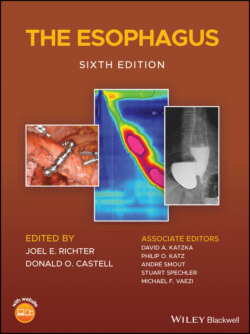Читать книгу The Esophagus - Группа авторов - Страница 99
Differential diagnosis
ОглавлениеThree disorders are commonly confused with rumination syndrome (Table 4.2). The most evident is gastroesophageal reflux disease (GERD). In severe GERD manifested by sustained and marked incompetence of the lower esophageal sphincter with or without a hiatal hernia, volumetric reflux of gastric content may occur. Although the regurgitant is typically acidic and therefore sour and bitter‐tasting, if patients have adequate acid suppression with PPIs, refluxed content may be bland in taste. Characteristics that distinguish GERD from rumination are symptoms that are dictated by gravity. Specifically, GERD symptoms occur commonly in the supine position with sleep and with bending over, in contrast to rumination, which stops with sleep.
A second disorder confused with rumination is achalasia. Similar symptoms include regurgitation of bland content, both liquids and solids, typically during or shortly after a meal. Characteristics that distinguish achalasia from rumination syndrome are the likeliness of regurgitation to occur with larger volumes of ingestant, nighttime symptoms, and accompanying chest pain. Weight loss is also more common in achalasia, where patients may stop eating when regurgitation begins and/or eat smaller meals to avoid regurgitation. Patients with achalasia also may have stereotactic movements to facilitate esophageal transit such as sitting up straight and walking postprandially, which are not incorporated into the behavior of ruminators.
The third disorder is bulimia. This is not uncommonly mistaken for rumination since both disorders can occur in female teenagers and young adults. Factors that distinguish bulimia from regurgitation are the need to voluntarily cause regurgitation in contrast to the effortless regurgitation that occurs with rumination syndrome.
Table 4.1 Rome IV criteria of rumination syndrome.
| Main criteria Persistent or recurrent regurgitation of recently ingested food into the mouth with subsequent spitting or re‐mastication and swallowing. Regurgitation is not preceded by retching. |
| Supportive criteria Effortless regurgitation events usually are not preceded by nausea. Regurgitant contains recognizable food that might have a pleasant taste. The process tends to cease when the regurgitated material becomes acidic. Criteria fulfilled for the past three months with symptom onset at least six months before diagnosis. |
Table 4.2 Differential diagnosis and contrasting features of rumination syndrome.
| Disease | Acid reflux | Night sx | Wt. loss | PPI response | Worse supine | Dysphagia |
|---|---|---|---|---|---|---|
| Rumination | – | – | –/+ | – | – | – |
| GERD | + | + | – | + | + | +/– |
| Achalasia | – | + | + | – | + | + |
| EoE | – | – | – | +/– | – | + |
